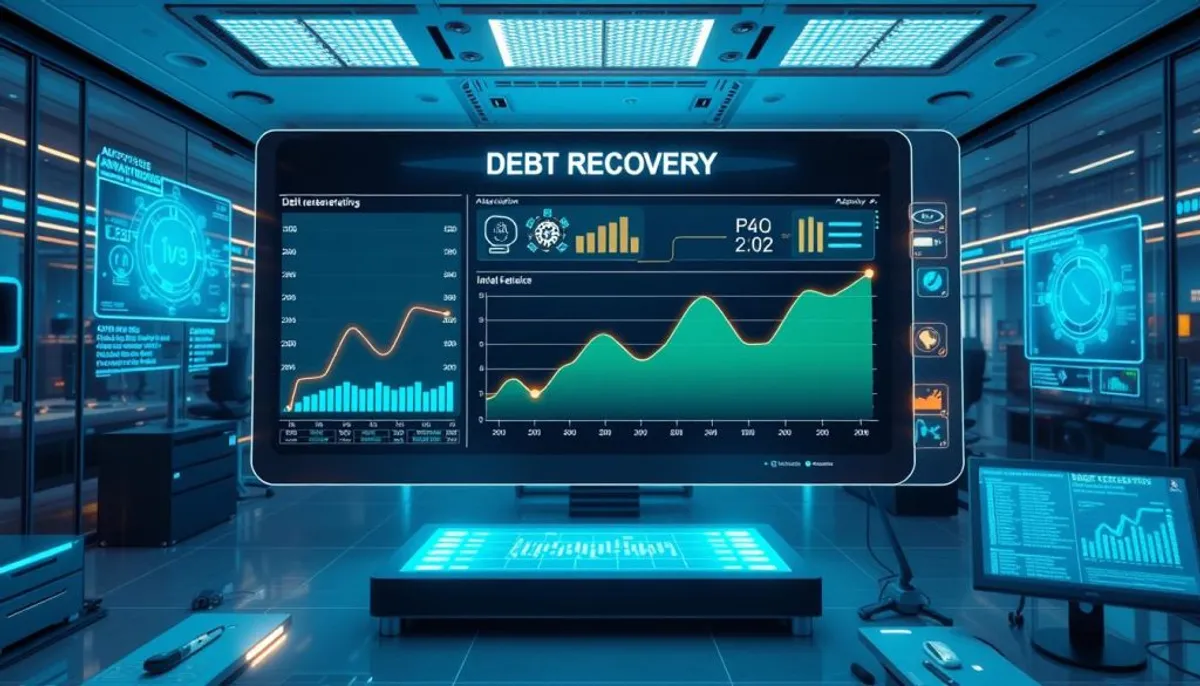In the realm of small business, the management of accounts receivable stands as a pivotal task. Summit A*R, a leading debt recovery service, has been instrumental in assisting businesses in reclaiming their rightful assets for nearly three decades. Their impressive track record of resolving over 25,300 accounts within the past year solidifies their position as a premier choice for delinquent account collections.
Their distinct “P.H.D. Philosophy” distinguishes them in the industry. By prioritizing the preservation of human dignity, Summit A*R ensures ethical practices, eschewing automated systems. This commitment has resulted in a remarkably low consumer complaint rate of just 0.02%.

For small business owners, the decision between handling collections internally or seeking professional assistance can be overwhelming. Summit A*R presents a viable alternative, offering professional accounts receivable management without the burden of substantial legal expenses. Their team, comprised of seasoned professionals with at least a decade of experience, brings invaluable expertise to each case.
Key Takeaways
- Summit A*R has recovered $160 million for clients to date
- Ethical collection practices lead to a 0.02% consumer complaint rate
- Experienced professionals handle each case personally
- Cost-effective solutions for small businesses
- Comprehensive services including skip tracing and legal support
- Transparent pricing with competitive contingency rates
Understanding Professional Debt Collection Services
Professional debt collection services have become essential for small businesses aiming to recover outstanding payments. The Collection Bureau of America, established in 1959, exemplifies the trust in third-party debt collectors. With licenses across all 50 states, this agency showcases the evolution of commercial debt collection practices.
The Evolution of Modern Collection Practices
Today’s debt recovery process employs a multi-channel approach. Collectors leverage letters, phone calls, and emails to contact debtors. This evolution mirrors the industry’s adaptation to changing communication preferences and technological advancements.
Benefits of Professional Collection Services
Professional collection services offer numerous advantages for small businesses:
- Specialized expertise in debt recovery
- Improved cash flow
- Maintenance of positive customer relationships
- Multi-service offerings (e.g., first-party recovery, third-party collections)
Industry Standards and Compliance
The debt collection industry adheres to strict standards and compliance regulations. The Fair Debt Collection Practices Act (FDCPA) governs consumer collections, prohibiting harassment and unfair practices. Reputable agencies prioritize ethical practices, maintaining impeccable compliance records.
| Aspect | Details |
|---|---|
| Fee Structure | 20-50% contingency fee; $10-$15 fixed fee for accounts <90 days past due |
| Collection Timeline | Typically sent to agencies at 90-120 days past due |
| Legal Restrictions | No contact before 8 am or after 9 pm; no excessive communication or threats |
| Debtor Rights | Right to dispute debt; report illegal activities to FTC or CFPB |
Collection Agency for Small Business: Complete Guide
Small businesses encounter distinct hurdles in debt recovery. Grasping the collection process is vital for preserving cash flow. This guide delves into essential facets of employing a collection agency for your small business.
Timing is paramount when contemplating small business debt consolidation. Typically, businesses refer customers to collections 90 to 120 days post the original due date. It’s imperative to exhaust all other payment avenues first, as engaging a collection agency signifies a significant step.
Before delving into business credit card settlement or other collection strategies, assess the debt amount. Ensure the efforts and expenditures are proportionate. Direct communication with the debtor is often the initial recommended action. Sending demand letters can effectively prompt payment.
- Provide all relevant documents to the collection agency
- Comply with state laws and respect consumer rights
- Use ethical practices to protect relationships and reputation
In selecting a collection agency, confirm their qualifications and grasp their methods. Scrutinize contracts meticulously and consider costs against potential recovery. Remember, collection agencies usually charge 40% to 70% of the recovered sum.
| Consideration | Impact |
|---|---|
| Improved cash flow | Positive |
| Customer relationships | Potential negative |
| Reputation | Possible harm |
| Legal costs | Variable |
By comprehending these elements, small businesses can make informed choices regarding debt recovery tactics, including small business debt consolidation and business credit card settlement options.
Revolutionizing Debt Recovery with ti3 Platform
The ti3 platform is revolutionizing debt collection technology. This cutting-edge SaaS solution excels in managing overdue accounts with unmatched precision and efficiency. It streamlines collection processes, marking a significant shift for businesses of all sizes.
Automated Payment Reminders and Escalation
Ti3’s automated invoice routing system swiftly identifies unpaid invoices. It dispatches timely payment reminders to clients, significantly reducing manual labor. When payments remain unpaid, the platform escalates issues automatically. This ensures that no debt is overlooked.
Client Relationship Management Features
The platform stands out in maintaining positive client relationships. It offers customizable communication options, enabling businesses to tailor their approach. This personal touch helps preserve valuable customer connections while recovering debts.

Cost-Effective Alternative to Traditional Collections
Ti3 presents a cost-effective alternative to traditional collection methods. It reduces labor costs and enhances recovery rates. The platform’s integration with QuickBooks Online further boosts its efficiency, making it a wise choice for small businesses.
| Feature | Benefit |
|---|---|
| Automated Reminders | Reduces manual work, improves timely payments |
| Issue Escalation | Ensures no debt is overlooked |
| Client Management | Maintains positive relationships |
| QuickBooks Integration | Streamlines financial processes |
Maximizing Accounts Receivable Management
Effective accounts receivable management is vital for enhancing cash flow. Optimizing invoice management processes significantly boosts financial health. We will examine key metrics and strategies to improve your accounts receivable performance.
Tracking essential metrics is crucial for assessing the efficiency of your receivables process:
- Days Sales Outstanding (DSO): Aim for under 30 days
- Average Days Delinquent (ADD): Keep as low as possible
- Accounts Receivable Turnover Ratio: Lower ratios indicate quicker revenue collection
- Collection Effectiveness Index (CEI): Strive for close to 100%
AR automation software can transform your receivables management. It reduces time spent on cash collection by up to 80% and efficiently collects up to 99% of outstanding payments. This technology streamlines billing, payments, and collection processes, minimizing payment time and avoiding bad debt.
| Industry | AR Management Focus | Key Benefit |
|---|---|---|
| Manufacturing | Longer payment terms, timely invoicing | Improved inventory and production scheduling |
| Retail | High-volume, short-cycle transactions | Efficient cash application and reconciliation |
By adopting these strategies and leveraging technology, businesses can maximize their accounts receivable management. This leads to improved cash flow and overall financial performance.
Strategic Approaches to Debt Recovery
Debt recovery necessitates the implementation of intelligent strategies to achieve optimal outcomes. The escalating trend of consumer debt, which reached $14 trillion in 2019, poses significant challenges for businesses. To overcome these hurdles, enterprises must adopt methodologies that strike a balance between operational efficiency and adherence to legal frameworks.
Skip Tracing and Advanced Location Services
Identifying debtors who have relocated without prior notice is paramount. Skip tracing services play a vital role in pinpointing defaulters, ensuring uninterrupted communication. Collecting comprehensive customer data, such as social security numbers and employment information, facilitates subsequent tracking efforts if necessary.
Negotiation Techniques and Settlement Options
The success of debt negotiation heavily relies on a deep understanding of the debtor’s circumstances. Presenting settlement options can expedite the resolution process. Customized payment arrangements enhance cash flow for both parties involved. By segmenting borrowers based on debt type and repayment history, debt negotiations can be tailored to meet specific needs.
Documentation and Reporting Systems
Accurate documentation is indispensable in debt recovery endeavors. It guarantees compliance with regulatory frameworks, such as the Fair Debt Collection Practices Act. Leveraging collections CRM software simplifies processes and automates communication. This technology facilitates the monitoring of progress, prioritization, and evaluation of success rates.
| Debt Recovery Method | Effectiveness | Cost |
|---|---|---|
| In-house Collection | Moderate | Low |
| Third-party Agency | High | 25-50% of debt |
| Legal Action | Very High | High |
Commercial Debt Collection Best Practices
In the realm of B2B collections, success is predicated on grasping industry-specific debt collection methodologies. Commercial debt collectors encounter distinct hurdles compared to their counterparts in consumer debt collection. They must navigate intricate business relationships while upholding ethical standards, as mandated by entities like the Commercial Collection Agencies of America (CCAA).
B2B Collection Strategies
Effective B2B collections necessitate a customized strategy. Debt collectors typically initiate with a demand letter, detailing the debt and available payment options. Should this initial approach fail, negotiation becomes paramount. Many collectors are amenable to devising equitable repayment plans with businesses. It is imperative for debtors to foster open communication and eschew ignoring collectors’ communications, which can exacerbate the situation.

Industry-Specific Collection Approaches
Varying industries necessitate distinct collection methodologies. For instance, sectors with protracted payment cycles might benefit from extended payment terms. In contrast, industries characterized by rapid turnover may necessitate more forceful strategies. Grasping these subtleties is essential for efficacious debt recovery.
| Industry | Common Payment Terms | Collection Approach |
|---|---|---|
| Manufacturing | Net 30-60 | Flexible payment plans |
| Retail | Net 30 | Prompt follow-up |
| Construction | Net 60-90 | Lien rights utilization |
Commercial debt collectors must strike a balance between assertiveness and preserving business relationships. Unlike consumer debt collection, B2B collections are not governed by the Fair Debt Collection Practices Act, enabling more direct approaches. Yet, ethical practices remain indispensable to safeguard professional reputations within the business sphere.
Technology Integration in Modern Collections
Debt collection software has transformed the landscape of handling outstanding payments. It introduces automated processes, significantly reducing manual labor and enhancing efficiency. Tratta.io’s platform stands as a prime example, offering multi-channel communication with debtors through calls, texts, and emails.
Modern debt collection tools seamlessly integrate with popular CRM systems and financial management software. This integration fosters a unified approach to managing customer relationships and financial data. Tratta’s platform provides data-driven insights through reporting and analytics, aiding businesses in refining their collection strategies.
- Predictive and power dialing capabilities
- Customizable debtor interactions
- Automated payment reminders
- Compliance support for industry regulations
Fair Capital’s Synergy platform showcases the transformative power of technology in collections. It offers automated invoice routing and quick setup, enabling businesses to recover more debts with less effort. The platform can be tailored to meet specific business needs, such as setting delinquency thresholds and minimum debt amounts for collection.
| Feature | Benefit |
|---|---|
| Automated Routing | Reduces manual effort |
| Multi-Channel Communication | Improves debtor reach |
| Data Analytics | Enhances collection strategies |
| CRM Integration | Streamlines customer management |
By embracing these technological advancements, businesses can significantly enhance their debt recovery rates while maintaining positive customer relationships. The future of collections hinges on balancing automation with personalized approaches, ensuring compliance, and leveraging AI for more effective debt recovery strategies.
Measuring Collection Success and ROI
Evaluating debt recovery ROI and collection performance metrics is crucial for small businesses. These measures help gauge the effectiveness of collection efforts and justify outsourcing decisions.
Key Performance Indicators
Successful collection agencies track several vital KPIs to measure their performance:
- Recovery rate
- Average time to collect
- Cost per dollar collected
- Customer retention rate
Recovery Rate Analytics
Recovery rate analytics provide insights into collection efficiency. A high recovery rate indicates effective strategies and processes. For example, top agencies boast recovery rates of over 90% for accounts less than 90 days past due.
Client Satisfaction Metrics
Client satisfaction is a key indicator of collection success. Metrics include:
- Net Promoter Score (NPS)
- Client retention rate
- Positive reviews and testimonials
These metrics reflect both financial results and customer experience in debt recovery efforts.
| Metric | Industry Average | Top Performers |
|---|---|---|
| Recovery Rate | 40-50% | 70-80% |
| Cost per Dollar Collected | $0.20-$0.25 | $0.10-$0.15 |
| Client Satisfaction (NPS) | 30-40 | 60-70 |
By focusing on these collection performance metrics, small businesses can optimize their debt recovery ROI and improve overall financial health.
Conclusion
Professional debt collection services have revolutionized small business financial management. They boast recovery rates up to 80% higher than in-house efforts, showcasing their significant value. These agencies focus on both collecting funds and maintaining ethical practices, ensuring business relationships remain intact.
The statistics are compelling. Debt collection agencies handle a vast number of cases, enhancing efficiency in debt resolution. Their utilization of advanced tools and technology significantly increases the chances of successful collections. Their extensive networks also play a crucial role in locating elusive debtors.
Yet, the journey is not without its challenges. While hiring a collection agency can be financially beneficial, with fees typically a percentage of the recovered amount, it’s essential to consider the downsides. The potential for reduced control over the collection process and possible impacts on your business’s reputation are significant factors to weigh.
In conclusion, professional debt collection services present a robust solution for small businesses facing unpaid invoices. By tapping into industry expertise and cutting-edge technology, these agencies enhance cash flow and offer cost-effective alternatives to traditional methods. This approach is a strategic step for any small business aiming to fortify its financial standing.
RelatedRelated articles



